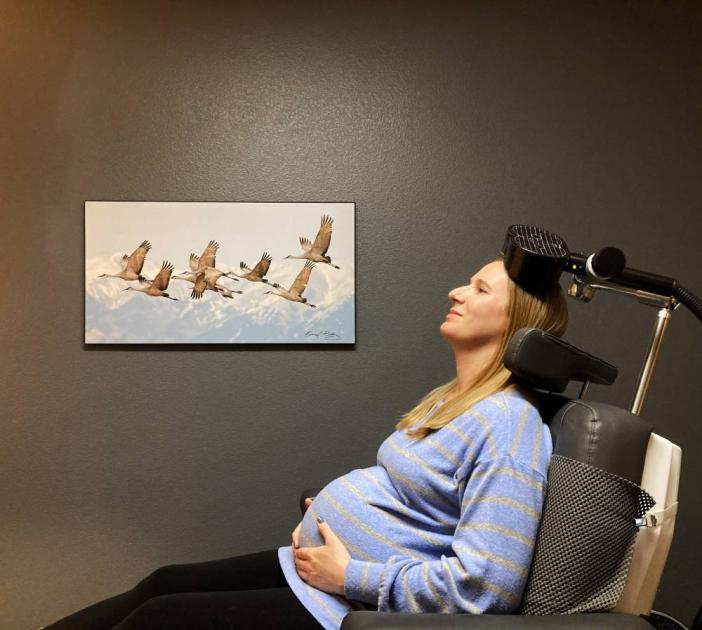Treating Post Partum Depression with TMS Therapy

Post Partum depression is not just the baby blues. It is a severe form of depression that can start within a few days of birth but may be not start until up to six or nine months after birth. Post Partum Depression can happen in mothers who have never had problems with depression before. Post Partum Depression can have a devastating impact on the mother’s ability to function, be happy with her new baby. Women with post partum depression often don’t know who to tell or where to turn to deal with these intense feelings of despair, hopelessness, guilt and feeling disconnected from your baby and from life. Fearful and in some cases even violent thoughts or intense anxiety can be part of post partum. While many are not aware of it, Post Partum Depression can occur in men as well. Please see our information below.

Caring for you so you can care for your baby!
Our TMS treatment program offers IMMEDIATE, NON-MEDICATION treatment for Post Partum Depression. There is no problem with continuing to nurse your baby as no medicine or hormones are added to your body, blood, or breast milk. TMS is highly effective for treatment of depression. We administer it over just 10 days of treatment given 2 treatments each day lasting in total about 40 minutes, three to five times per week. You can even bring your baby with you to the treatment if you wish. Women we have treated have experienced significant improvement within just two to three days.


Symptoms
Post Partum Depression often starts within a few days of giving birth. It is not just the baby blues. It is much more severe and intense, often frighteningly so for the mother affected and her family. It may take months to go away on its own and while finding a way to get more sleep and more support may help to some degree, these alone do not reverse Post Partum Depression. If you find that you are suffering from Post Partum Depression, reach out to us today. We can offer immediate intervention starting within just a day or two. You can get better.
Crying For No Reason
Crying, depressed mood, severe mood swings, intense anxiety or panic attacks may be present
Sleeping
Inability to sleep even when the baby is asleep or over sleeping even when the baby is awake
Fears You Are Not A Good Mother
Feeling worthless, shame, guilt, or inadequacy that persists even with support
Lack of Baby Connection
Having trouble bonding with your baby, or losing connection to your other children, partner, or family
Fear of Harming Yourself or The Baby
Thoughts of harming yourself or that you might harm your baby are signs of serious post partum depression. These thoughts do not mean hospitalization is needed. They do mean that treatment should start as soon as possible.
How are we treating Post Partum Depression with TMS
We offer a special urgent treatment for Post Partum Depression that involves no medication utilizing both rapid and accelerated forms of TMS for those who have no prior history of depression. If you have a history of depression prior to your post partum episode we will customize your treatment to fit your needs and that of your plan of insurance if relevant.
Step 1
Call us at 719-359-8812. You, your family, or your doctor can make the first call. We will interview you over the phone or if necessary, in person and determine if we can help you. There is no cost and no obligation for this assessment. We will let you know your costs and inform you about financing or help you make other arrangements.
Step 2
Come to our clinic for two treatment sessions a day, each about 5 minutes long about 30 minutes apart. The total time you will be in the office is about 45 minutes or less and you can bring your baby with you if you wish. A total of 10 days of treatments (20 total sessions) is needed, with relief often beginning on day two.
Step 3
In addition to TMS, you will get supportive counseling sessions twice a week with one of our senior therapists twice a week during this time of crisis at no additional cost to you. Life skills classes, acupuncture or acupressure sessions and biofeedback are also offered at no additional fee. This way, the whole person is addressed not just TMS. Sleep, depression and anxiety, guilt lack of connection and harming thoughts all resolve quickly for most, allowing you to remain at home where you need to be and still continue your treatment progress.
Men and Post Partum Depression
Sadly, men can get post partum depression as well as women. While for some men, it is more similar to Baby Blues, in others the full spectrum of Post Partum Depression occurs. Studies show 8 to 10% of men experience Post Partum Depression. The reasons really are the same: changes in sleep, hormones and social stress. For men who live with a pregnant woman, men experience alterations in prolactin, testosterone, cortisol and other hormones occur which can lead to depression. If the symptoms are significant our Post Partum Depression Program may help you.
Our experts

Doctors Profile
John l Fleming, MD. DLFAPA.
Medical Director of SCTMSC, LLC, John is a Board Certified Psychiatrist and a Distinguished Life Fellow of the American Psychiatric Association. He has over 40 years’ experience treating depression and related conditions and is recognized as a leader in the psychiatric profession. Since 2011 he has been a certified Provider Trainer and TMS provider for three different TMS treatment systems. His experience base includes psychopharmacology of complex conditions. psychotherapy of individuals and couples and the medical aspects of psychiatric illness. He has annually been selected by his peers as one of America’s Best Doctors since 2005.

Melissa Hammock, M.A., M.Ed., LMFT
Services Director of SCTMSC, LLC, Melissa received her master’s degree in Marriage and Family Therapy from Azusa Pacific University and her master’s in special education from California State University, Los Angeles. Melissa is a Certified Life Coach and a member of the International Positive Psychology Association. Melissa is also a Certified TMS Provider.
Melissa has been in private practice in Colorado Springs since 1981, working with adults, adolescents, and couples. Melissa specializes in the treatment of depression, anxiety, ADHD, and trauma-based disorders. She has received training in EMDR, Cognitive Therapy, Family Systems Therapy, Energy Therapies, Interpersonal Therapy and Accudetox. Melissa is a Licensed Marriage and Family Therapist. She has been involved with TMS treatment since 2011.

Joe Hammock, M.A., PhD, Licensed Clinical Psychologist
Clinical Director of SCTMSC, LLC and Certified TMS Provider since 2011, Joe is a licensed psychologist and member of the American Psychological Association. He is a graduate of Fuller Graduate School of Psychology, and additionally holds an MA from Fuller Theological Seminary. He is certified by the International EMDR Association and is a Certified TMS Provider.In his thirty years of practice in Colorado, he has specialized in the treatment of trauma-based disorders, depression, anxiety disorders, and dissociative disorders. He also has extensive experience in psychological evaluations, CBT, EMDR, forensic psychology, and is frequently consulted as an expert witness.
Mental Health Assessment
Do you believe that you suffer from depression or anxiety? Check out our online assessments for a quick online self-assessment to see if you suffer from a mental health related issue and to see if you qualify for treatment with TMS.
PLEASE CALL US NOW, 719-359-8812. POST PARTUM DEPRESSION TREATMENT SHOULD NOT BE DELAYED
Resources
Check out the following links:
Colorado Support Line. 1-800-944-4773
FAQ
How does depression and its treatment change during pregnancy?
A person struggling with depression during pregnancy may become more withdrawn from other children or family members. Untreated depression is associated with an increase in birth defects and poor birth outcomes, so skipping antidepressant treatment is not recommended.
Because the mother’s blood volume increases significantly during pregnancy, dose adjustments of antidepressant medications must be constantly reviewed to avoid problems with breakthrough low level depression.
However, the FDA warns that the use of any antidepressant during the last six weeks of pregnancy can lead to a neonatal abstinence syndrome, in which the newborn experiences withdrawal from a drug that was present in the uterus, in this case the antidepressant. Common symptoms include sleepiness and irritability and an average 26 hour increase in hospitalization for the newborn. Some antidepressants can also increase the risk of birth defects when taken during the first three months of pregnancy.
What about the postpartum “baby blues” and breastfeeding?
If a mother is depressed at the time of birth, or becomes so during the three months after birth, she may find it much more difficult to emotionally bond with her infant or provide effective care. Up to 15% of mothers will experience postpartum depression. Postpartum depression is particularly likely to be associated with guilty ruminations, thoughts of death, and more rarely thoughts of murder/suicide. The increased risk of depression and severity of depression are related to hormonal changes that occur at the end of the pregnancy.
Regarding breastfeeding, all antidepressant medications are secreted in breast milk to some degree or another. Some experts recommend “pumping and dumping” breast milk that is produced within a few hours of swallowing an antidepressant, in order to limit infant exposure to antidepressants in breast milk. While much evidence suggests that antidepressant levels in breast milk may be too low to affect the baby, research is ongoing, and risks vary from one antidepressant to another.
What are the treatments for postpartum depression?
Many mothers do use antidepressant medications during pregnancy and breastfeeding without adverse effects. Others use a treatment specifically developed for postpartum depression called Zulresso™(brexanolone). This newly FDA-approved treatment is a synthetic form of progesterone, one of the maternal hormones that rapidly decreases in a mother’s body right after birth. Replacing this hormone can be highly effective at reducing postpartum depression. Sadly, many other people with postpartum depression simply try to grit through this very difficult time without necessary medical assistance.
How does TMS compare to hormone treatment for postpartum depression?
TMS is an effective treatment for depression that uses no medication or hormones whatsoever. Treatment takes about 15 minutes a day, five days a week, for six weeks. You can drive yourself to and from each session and even bring your baby if you choose. The treatment usually takes effect noticeably within a few weeks and lasts for about two years.
By contrast, Zulresso™(brexanolone) is administered during a hospital stay for 60 hours as a continuous IV infusion. Significant side effects are possible. The drug carries warnings of possible excessive sedation, sudden loss of consciousness, and dropping oxygen levels, which can occur in up to 20% of patients depending on the dose. Zulresso™ should not be administered during pregnancy itself because of the risk of fetal harm. It is secreted in breast milk to a degree that makes breastfeeding unsafe during and for a short while after the treatment. Zulresso™ is a Schedule IV controlled substance and is not available on an outpatient basis. It starts to take effect within about 2.5 days and is shown to last for at least 30 days after treatment is complete. Longer duration impact has not yet been studied.
Where can I get more information about depression and depression treatment during pregnancy and the postpartum period?
In addition to your own physician, obstetrician, and pediatrician, we recommend these two highly regarded resources on depression treatment during this intense and challenging stage of life:
www.womensmentalhealth.org is sponsored by the Mass General Hospital/Harvard Department of Psychiatry.
www.womensmentalhealth.emory.edu/ is sponsored by the Emory University Department of Psychiatry.
What the Patients Think

Cindy – 22
The Southern Colorado TMS Center is truly the most caring, compassionate mental health facility I have ever known. You always hear stories about why people have gone into the mental health field, but these folks truly live it. Everyone who works for SCTMSC (and I mean everyone), exudes warmth and empathy. They walk the walk. One of my family members utilized several of their services, and I got to witness firsthand how they deal with patients. I would highly recommend them to anyone suffering from depression, because they not only offer treatments but expect patients to participate fully in their recovery.

Pam – 25
Dear TMS staff, I want to express my thanks for all your sincere help while I went through a very difficult time. Every time I went to the center the staff was so kind and understanding. The educational classes in the evening were wonderful and I have learned so much about depression. I still look at the handouts you provided. I have gotten into meditation and continue to educate myself about depression and anxiety. If I watch “Friends” on the TV, I will always think of my experience at the Southern Colorado TMS Center!! Thank you for doing your job so well.

Barb – 46
All the staff at SCTMSC are very caring during all of the components of the TMS treatment. From dealing with insurance companies to adjusting one’s treatment time due to conflicts with your schedule; they are all wonderful. I would recommend TMS treatments to any person suffering MDD, as I have for many years. From my experience, TMS helped me far more than an anti-depression medication or CBT.

FB – 35
Dear TMS Team, I just wanted to say that 6 months after treatment, I am doing well. I have a new life and I am living it up. It is like being young again as I am finding my way again. I am so grateful to Dr. Fleming, Camice, Dawn and all the folks who helped me to get here! But especially to Dr Fleming.

Michelle – 37
Dear Dr. Hammock, I am so incredibly grateful and appreciative for all the time and attention you gave to my husband and me. Thank you, thank you for caring so much abut the individual person. I am also grateful that you took the time to help us separate out how we view ourselves in relation to our understanding of God’s love for us verses our symptoms of major depression; neither of us had realized or thought about that. That was incredibly insightful of you and so thoughtful of you to help us get to the root of it. Thank you for helping so many people. I can tell, that you and your team do a lot of good with very sincere hearts. It shines through unmistakably.

Jomaque C
I personally believe TMS should be the first line of treatment for major depressive disorder and generalized anxiety disorder – no medication changes and essentially no side effects! My treatment at Southern Colorado TMS Center is my second round of TMS therapy. The first round resolved my depressive symptoms for several years but when started feeling the depression come back, I knew exactly what to do. Southern Colorado TMS was able to get me scheduled quickly and started with therapy almost immediately. The staff worked on my behalf to have the treatment covered by insurance. I cannot speak highly enough about TMS therapy and Southern Colorado TMS. The therapy has improved my mood in just 8 weeks and the staff are top-notch! I felt welcome on each visit and appreciated the extra touches like a drink and snack after treatment. Southern Colorado TMS Staff – thank you so much for all your help!
Drug free solutions for optimized brain function
We focus on delivering real solutions for our patients. We know that patients can have real life-changing results through applying TMS.
Watch Our Videos
Do you want to learn more? Visit these videos
Your Healthy Family: TMS treatment for postpartum depression
Healthy Mom, Happy Family: Understanding Pregnancy and Postpartum Mood and Anxiety Disorders
Dads' Postpartum Depression
Other Conditions
Depression in Bipolar Disease
TMS can effectively treat depression in patients with bipolar disease and reduce problems with antidepressant use.
Depression in Bipolar Disease
TMS can help by treating the “depressive phase of” bipolar disease with no medication.
Depression in Adults
Many people suffer from depression. However, through the application of TMS they may find relief.
Depression in Adults
TMS effectively treats depression, without the use of medication.
Depression in
Adolescents
TMS can effectively treat depression in teens.
Depression in
Adolescents
As a teen goes through difficult changes in their adolescent years, they can experience serious depression. TMS can help teens who suffer from depression.


